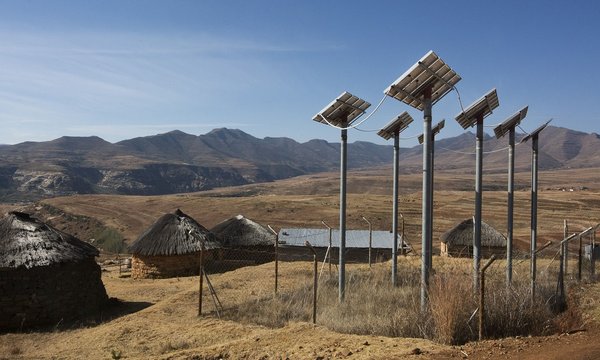 Read this article in French
Read this article in French- Share this article
- Subscribe to our newsletter
Africa needs country-specific solutions
The survey was compiled by 40 African experts in co-authorship with experts e.g. from the Mercator Research Institute on Global Commons and Climate Change (MCC – Berlin/Germany), the University College London/UK, the UN Economic Commission, the Climate Compatible Growth Programme and Oxford University/UK. The survey has been published in the renowned specialist journal Nature Energy.
“COP27 is Africa’s COP,” stresses Jan Steckel, who heads the MCC Climate Protection and Development working group and is a co-author of the survey. “It is important for us to listen to innovative people from Africa’s energy scene and learn from them. What counts is to give priority to access to energy, justice and investing in grid-bound and stand-alone power equipment in order to promote the UN targets for sustainable development and economic progress. Here, we hope the survey will be helpful.”
No one-size-fits-all solution for Africa
So far, the team of authors emphasise, the debate on Africa’s energy has been dominated by the Global North, with the continent being viewed as a uniform whole regarding energy demand and forward-looking approaches towards greenhouse gas neutrality. The survey demonstrates just how wrong this is, using analyses for four exemplary countries: Ethiopia, South Africa, Mozambique and Burkina Faso. For instance, in rural areas in Burkina Faso, less than five per cent of the population have access to electricity, and hybrid photovoltaic diesel systems can be a cost-efficient means of development. In contrast, Ethiopia is a green growth powerhouse, gaining 90 per cent of its energy from hydropower and cheap solar and wind plants, which promotes further development. This shows how different energy systems and needs are.
Furthermore, with an analysis of all 54 African countries, the research team highlight that with view to its development goals, each country sets out from its own context, develops its own solutions, and faces its own imponderabilities regarding the use of renewable energy or fossil fuel – and will probably therefore also seek its own path to success. “The global debate is characterised by generalisations which are of little help,” says Youba Sokona, Deputy Chairman of the International Panel on Climate Change (IPCC) and author the survey. “Our research shows that the international community has to accept and support country-specific nuances in order to achieve development and climate targets in Africa. The paths towards clean energy systems depend strongly on the extent to which they can be put into practice in the individual countries.”
Giving preference to renewable energies
The survey points to the advantages of renewable energies for Africa and the world as a whole, which have been widely demonstrated in research: growth, job creation, greater resilience towards climate change, strengthening the health system. In contrast, natural gas projects bear the considerable risk of failed investments, with impacts and possible counter-strategies having been little researched so far. “Here, several African countries, including Mozambique, are about to enter long-term commitments,” says Philipp Trotter of the University of Wuppertal/Germany and Smith School of Enterprise and the Environment at Oxford University. “With view to the economic, social and ecological goals, it is crucial for those in government to have the necessary information for sound decisions. At present, this is not the case. And it has to be borne in mind that today’s decisions in these countries can have decades of impacts.”
“Country-specific, evidence-based energy options and ways to implement them are now urgently required in Africa,” says Yacob Mulugetta, Professor of Energy and Development Policy at the University College London, and lead author of the survey. “This calls for national leadership and international donors, research support and tailored financing and investment. We hope that this research project will encourage Africa’s governments to assume more responsibility for their energy decisions – i.e. to take a long-term view of the energy system and ensure that its future lies in their hands and serves the needs of their people.”
(MCC/pas)
Further information:
Website of the Mercator Research Institute on Global Commons and Climate Change (MCC)
Original publication: Mulugetta, Y., Sokona, Y., Trotter, P., et al., 2022, Africa needs context-relevant evidence to shape its clean energy future, Nature Energy





Add a comment
Be the First to Comment